Belcarra Garden Club
BC, Canada
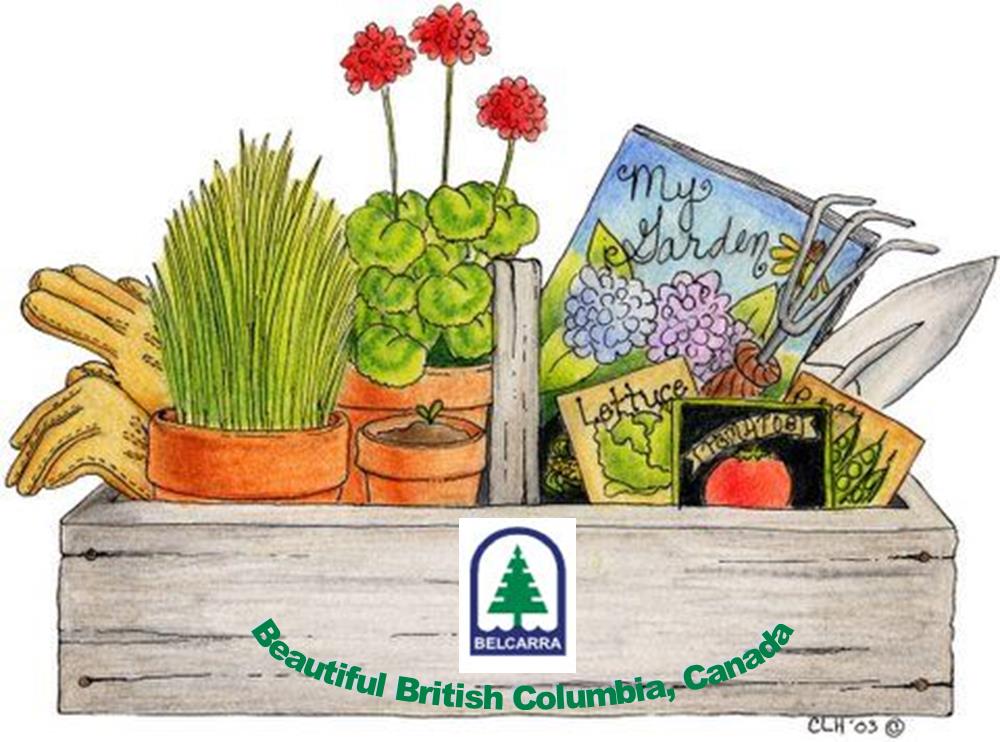
Two Exciting Field Trips... Two Dedicated Brothers!
Part 1: Fruits and Shoots Plant Farm– Jack Oostenbrink
 |
 |
Jack has been running his nursery for 3 years now, but has growing plants with his family on their farm since 2010. He has over 25 years’ experience in the field of landscaping and really knows which plants do well in the Fraser Valley! His interest in plants started as a youngster and he worked with Brian Minter for over a decade. Jack also co-teaches an organic gardening course with his brother Dan. He is passionate about encouraging others to experience their outdoor gardens through a variety of textures, fragrances, sounds, and motion.
A big difference in Fruits and Shoots is that their focus is on the home gardener. Large commercial growers, such as Proven winner and Terranova, are focused on the retail stores. They often use hormones and fertilizers to produce fast-growing, early blooming plants. These plants are compact to fit in pots on the shelves and the growth hormones stop veggies from stretching. The buyer is then left to wonder why their purchases don’t perform as well once they are planted in the home garden.
 |
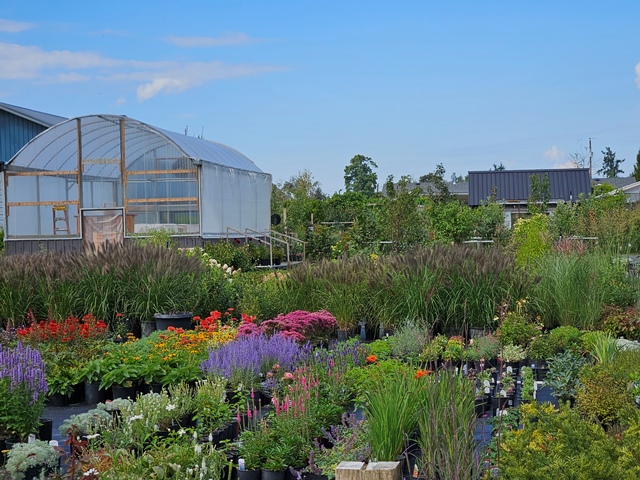 |
Jack likes to bring in different, sometimes unusual, plants as bare roots or seeds, often bringing them in from Holland or Europe. It may take a couple of years before the plants are ready for sale to the public. He likes to include old-fashioned varieties which may be passed by in the bigger retail stores. This year he is hoping that his new greenhouse will help combat the cold of winter and give him an early start in spring. Jack noted that the garden industry is actually NOT “green”. The amount of plastic involved, for pots, trays etc, is a lot. Jack does his best to recycle and minimize the environmental footprint of his nursery business.
One big challenge in a nursery is accommodating the special needs (water, sun, soil) for all the different types of plants. Jack uses the no-till method for his veggies and edibles, along with nutrient rich compost. By keeping his potted plants on landscape fabric, he avoids the need for chemical (and physical!) weeding. He did note that his veggie garden has more weeds this year than he would like and reminded us that compost must reach a high temperature in order to kill the weed seeds. Jack doesn’t bother with planting “sacrificial plants” such as marigolds or use products such as neem oil. He is thankful for the wasps, because they eat the aphids! We were amazed when he proudly showed off his huge onions and garlic. An interesting variety, new to most of us, was the “red torpedo onion”.
Jack finished off our visit with some useful tips for fruit trees. The key to a great fruit tree is to summer prune!
He likes to prune in the month of June, sometimes July (August is too late). After pruning, the tree sets out new fruit buds. For trees that like to grow tall, you can weight down the branches to get fruit at your height!
You may have thought you can’t grow apples, but actually they can grow without solid sun.

Thank you, Jack, for a very interesting look “behind the scenes” of a nursery.
We could tell how dedicated you are to creating harmony and art in the garden, and bringing nature into the lifestyle of your clients.
Here is a collection of photos from this delightful field trip!
 23-09Fruits_and_Shoots-PDF
23-09Fruits_and_Shoots-PDF
Jack hopes you can visit his Plant Farm!
Fruits and Shoots Plant Farm 9660 Pelly Road, Chilliwack, bc, V2P 6H4
https://www.fruitsandshoots.com/
******************************************************************************************************
Part 2: The Local Harvest Market– Dan Oostenbrink
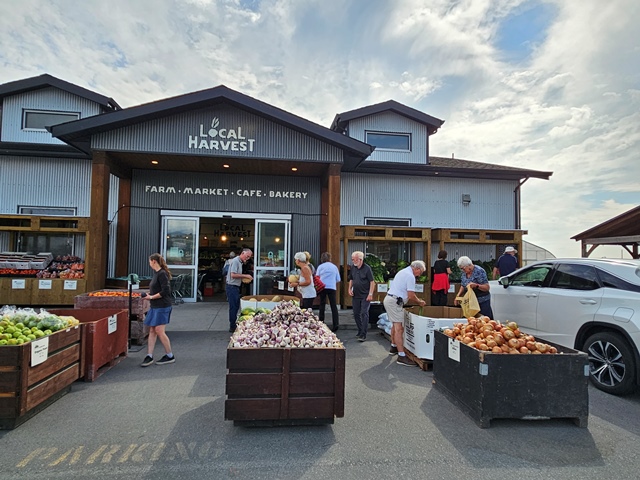 |
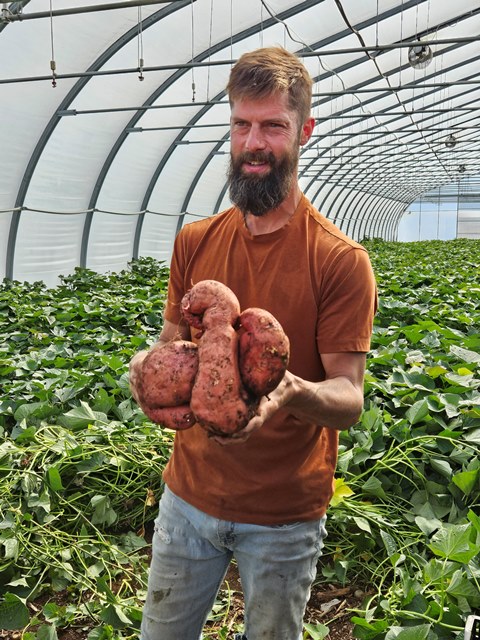 |
There was no doubt that Dan lives and breathes “sustainable farming” on his 37 acre parcel of land! This family run business is now in its 11th season and prides itself on intensive food production with a 100% local base. They are “no-till, no spray, carbon-sequestering, soil-regenerative farmers”. Produce is seasonal so February and March are their only time off! He has 3-5 fulltime employees and lots of students working (and learning!) in the summer. Dan also co-teaches an organic gardening course with his brother, Jack.
Dan let us know immediately that his number one priority is biodiversity and ecological balance.
This year the farm has 30 acres of veggies, but by next year they will produce the same amount of food on only 25 acres! (The last 5 can then go to the cows!) The first greenhouse we visited was full of sweet potatoes, and we amazed to hear that this crop probably numbered 10,000! Wow, something great is going on here! Much of the farm direct sales go to high end restaurants, who want truly organic and sometimes uncommon, products.
Dan shared his 5 most important keynotes with us. The 1st is to incorporate all the biodiversity of the wilderness. There are plants, animals, insects, worms and the soil is enriched by this variety of life. The 2nd rule on the farm is that the ground is covered at all times with decaying, decomposing plant material. Bare ground is an alarm, and plastic “mulch” is forbidden! The 3rd rule is that the ground is covered with living plants all the time. Dan doesn’t bother with rotating crops. His spent fields are always adding nutrients, and with the focus on biodiversity, the land takes care of itself. Number 4 is succession planting. This complements rules #2 and #3, keeping the ground covered. Number 5 is more of a strategy than a rule. The land is watered by mini sprinklers, frequently and in short bursts during the day. Some of the plants, like brassica, hate the heat and this 2 minute burst cools them down.
The greenhouse with giant tomato plants was the next stop. It seems that tomatoes are self-pollinating monoecious plants so they don't have to have bees. They are given compost every 3 weeks. The compost is made up of mushroom and cow manure mixed with wood chips. Ginger was also doing well in this greenhouse. Dan sprouts Peruvian Ginger inside and then moves it to the greenhouse in May.
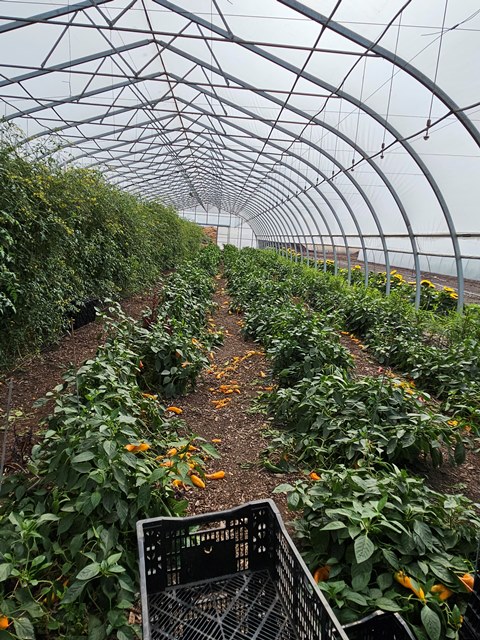 |
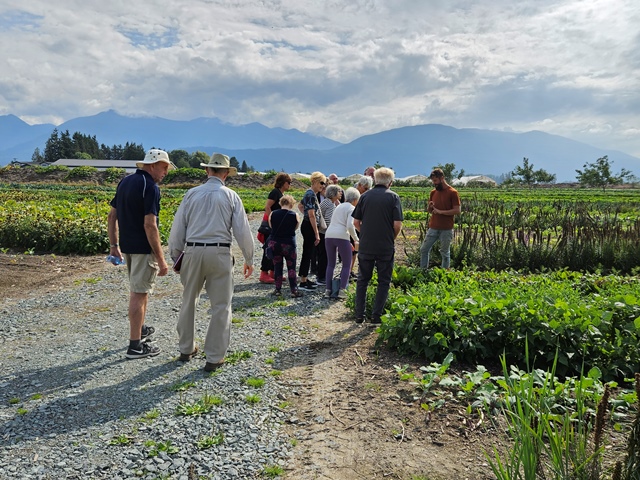 |
One problem in North America, Dan related, is that food has to look perfect so a lot of his produce has to go to venues other than retailers. His example was cantaloupes. It seems that the best time to harvest and eat them is when they are so full and ripe that they have a little crack in the skin. This renders them unsuitable for sale!
*The giant 10 foot sunflowers are flail mowered after harvesting. Everything goes back into the soil.
*Melons need hot days and cool nights (10-11degrees) in order to ripen.
*If you cut back your herbs now, (September) you will get a flush for Thanksgiving. Dan does succession planting 4 times per year.
*Sorrel is sour but is an early grower and is tender in the spring. The Mennonites buy from Dan in order to make a soup from it!
*Uchiki Kuri squash is a specialty sold to high end restaurants. It has a very thin skin and a deep orange color.
*Kabocha squash, or Japanese pumpkin, is another sought after variety.
* Delicata squash has a fine, edible skin so doesn’t need peeling.
* His giant Jerusalem Artichoke “hedge” started off with just a small planting! The roots can be roasted.
* Dan grows some flowers as “bug magnets” that additionally suppress weeds. Phacelia is fast growing ( 55 to 60 days to flower but watch out as it is a self-seeder. Alyssum is also good.
* In Vermiculiture 15 to 27 degrees C (60 to 80 degrees F ) is optimal. Below 4 C or above 35 C is lethal.
* Red wigglers like to live in compost but not in soil. (Dan sells them $75 for a pound with a 1000 worms.)
*With respect to compost, most deciduous trees are good but not evergreens, especially cedar and hemlock.
When it is ready, his big compost pile is then sifted along to the next pile. He particularly likes to use Fraser river logs as they have the benefit of glacial till with micronutrients. (Dan sells compost at $60 a yard.)
*Chickens (and we counted at least 80 of them!) are moved from greenhouse to greenhouse to eat all the leftovers and make manure! They also have a flock of turkeys!
* We asked whether the farm was compromised in the big Abbotsford flood in 2021. Sadly, yes, the fields were flooded, root rot was everywhere, and nothing survived. They had to start again from scratch.
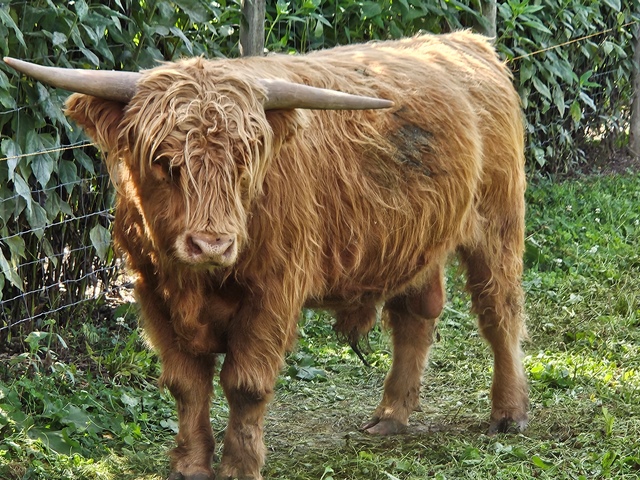
Dan finished our visit with a special treat… getting to see his magnificent Scottish Highland cattle! At present he has a giant bull, a female, a yearling male and a youngster male. They are an important part of creating green fertile pasture. Thank you so much, Dan, for taking the time to show us part of your huge, prolific farm! (and in bare feet the whole time! You are amazing!) We could feel your passion and your pride in creating a biodiverse, bountiful farm that is truly an inspiration!
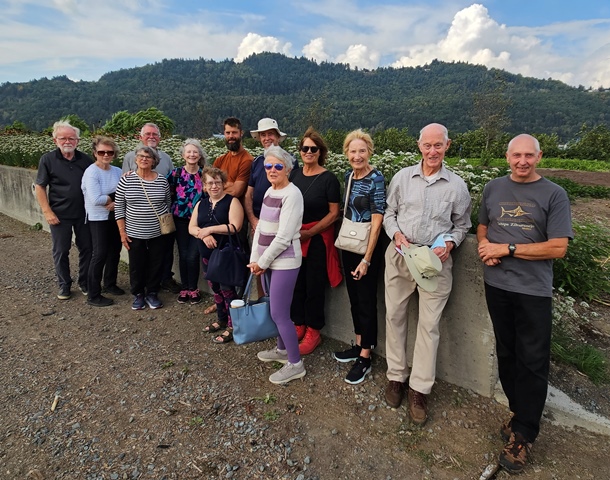
Here is a collection of photos from this delightful field trip!
 23-09Local_Harvest-PDF
23-09Local_Harvest-PDF
Be sure to check out Dan's fantastic market... and see if he is still barefoot in the fields!
Local Harvest Market - 7697 Lickman Road, Chilliwack, bc, V2R 4A7
https://thelocalharvest.ca/